Published: march 21, 2010; Der Spiegel – “It is a clash of Civilizations.”
Interview conducted by Martin Doerry and Christoph Schult.

The Israelis announced they would build 1,600 new homes in East Jerusalem. The move has caused relations between the Israelis and Washington to deteriorate to an historic low point. The homes are to be built in Ramat Shlomo, a religious Jewish settlement. Around 200,000 Jews live in parts of East Jerusalem annexed after the Six-Day War in 1967. Photo: Reuters
In a SPIEGEL interview, Israeli Foreign Minister Avigdor Lieberman, discusses his country’s controversial settlement policies, the threat posed by Iran’s nuclear program, the seeming hopelessness of the conflict with the Palestinians and explains why his country is not ready to negotiate over the status of Jerusalem, why he believes peace cannot be imposed in the Middle East and how tougher Western sanctions could be enough to “suffocate” the Iranian nuclear program.
SPIEGEL: Mr. Foreign Minister, the week the Palestinians finally agreed to hold new peace negotiations, your government announced plans to build 1,600 more housing units in a Jewish settlement in East Jerusalem. You have provoked not only the Palestinians, but also your most important ally. Why?
Lieberman: We didn’t provoke anybody. I hear all the condemnations of Israel regarding so-called East Jerusalem. In the same week 60 people were killed in Pakistan in terror attacks. In every country around us there is bloodshed and tension. But everybody prefers to criticize Israel. I am waiting for the day when the German Bundestag debates the violation of human rights in Saudi Arabia.
SPIEGEL: But we are speaking to the Israeli foreign minister, not the Saudi one.
Lieberman: To put all the blame on Israel is hypocrisy. We are the only democracy in the Middle East. The Israeli-Palestinian conflict represent maybe 3 percent of all the conflicts in the region. Members of the United States Congress and US Senators tell us that, in their visits to the Gulf countries, Egypt, Saudi Arabia or Jordan, their Arab counterparts only very briefly mention the Palestinians, and that it is pure lip service. Ninety-five percent of the time they warn about the Iranian threat.
SPIEGEL: But at the moment everybody is speaking about Israel. The US is blaming your government for undermining the peace process and cancelled a visit of its special envoy George Mitchell.
Lieberman: Even between the best of friends mistakes and misunderstandings can happen. We never promised to stop building in Jerusalem. But the announcement during the visit of US Vice President Joe Biden was a mistake — a bureaucratic mistake of the building committee in charge.
SPIEGEL: So you are only criticizing the timing but not the plan to expand existing settlements?
Lieberman: You must understand: It is not settlements. Sixty-five percent of the Jewish population of Jerusalem live in new neighborhoods that we started to build after the Six-Day War in 1967.
SPIEGEL: Even the Americans regard them as settlements. They lie beyond the ’67 borders and that is a problem.
Lieberman: They lie beyond the ’67 borders, but they are not small villages, but municipal neighbourhoods with tens of thousands of residents.
SPIEGEL: So your problem is even bigger!
Lieberman: It’s not a problem, it’s an integral part of our capital. We are not ready to negotiate about Jerusalem.
Part 2: ‘We Expect the Americans To Put Pressure on the Palestinians’
SPIEGEL: On the one hand you are criticizing the Palestinians for setting pre-conditions, on the other hand you yourself refuse to talk about such a controversial core issue like Jerusalem.
Lieberman: Prime Minister Benjamin Netanyahu gave a speech at Bar-Ilan University, in which he recognized for the first time the two-state solution. That was a difficult decision for us; don’t forget, this is a right-wing government. Secondly, we diminished the number of roadblocks and improved the access and movement for the Palestinians. By doing so, we created economic growth in the Palestinian cities of 8 percent. Thirdly, we undertook a moratorium in the settlements …
SPIEGEL: … to which you don’t adhere: Just recently, Defense Minister Ehud Barak has given permission for 112 new apartments in the West Bank settlement of Beitar Illit.
Lieberman: Within one year we made many concessions in advance, but despite that the whole world says: “OK, that’s good, but you must deliver more.”
SPIEGEL: The US is now demanding further gestures from Israel following the crisis over the Jerusalem settlements. Will you deliver?
Lieberman: Within one year we have made many gestures towards the Palestinians. We expect the Americans to put pressure on the Palestinians to stop anti-Israeli activities in the international arena. The Palestinians have to withdraw their law suits against Israeli officers, stop the boycott of Israeli goods and all incitement. What incentives do we have for agreeing to further compromises?

In an interview with SPIEGEL, Israeli Foreign Minister Avigdor Lieberman accuses the international community of making a strategic mistake with its thinking that peace can be imposed. "First of all we want security," he says. "First you have to provide security and prosperity, then you can bring about a comprehensive solution." Photo: Reuters
SPIEGEL: Does the prospect of signing a peace treaty with the Palestinians mean nothing?
Lieberman: First of all we want security. The international community is making a strategic mistake. You cannot impose peace. First you have to provide security and prosperity, then you can bring about a comprehensive solution.
SPIEGEL: So in your view the negotiations with Palestinian President Mahmoud Abbas are useless?
Lieberman: No. We have to keep the political process alive. Talks are better than nothing. The problem is that we don’t know whom Abbas represents. His Fatah party lost the elections in 2006. In 2007, Hamas took over power by force in the Gaza Strip.
SPIEGEL: Nineteen years after the peace process started in Madrid with indirect talks, you are again leading “proximity talks.” US Special Envoy Mitchell wants to commute the five kilometers between Jerusalem and Ramallah. Why does this have to be so complicated?
Lieberman: We were for direct talks from the beginning, whether in Jerusalem or Ramallah. It is the Palestinians who object to it. And they feel strengthened because the West constantly speaks about the settlements.
SPIEGEL: Do you think the Americans are naïve?
Lieberman: I don’t know whether they are naïve. I believe in facts, and they are: Despite the settlements, we signed two peace agreements — one with Egypt and one with Jordan. And although both Ehud Barak and Ehud Olmert were ready to evacuate most of the settlements and withdraw to the ’67 border, the Palestinians refused to sign. With the Oslo agreements we gave up half of the West Bank …
SPIEGEL: … It wasn’t you, but rather the leftist government of then-Prime Minister Yitzhak Rabin.
Lieberman: Yes, I was against it and I am sorry to say that I was right. For 16 years we made concessions, but the Palestinians have only rejected them. And this despite the fact that on the Israeli side there were all these nice guys: Rabin, Peres, Barak, Olmert, Sharon. Not such bad guys like me …
SPIEGEL: Sharon, a nice guy?
Lieberman: He vacated the settlements in the Gaza Strip.
Part 3: ‘A National Conflict … Developed into a Religious Conflict’
SPIEGEL: Why do you need the settlements at all?
Lieberman: First of all, Judea and Samaria are the birthplace of our nation since the days of the Bible. But the settlements are also important for our security.
SPIEGEL: The settlements? Do they not actually endanger your security?
Lieberman: No, the settlements around Jerusalem, for example, serve like a fence for us.
SPIEGEL: But you have already built a wall that separates Jerusalem from the West Bank.
Lieberman: The settlements are like a second security ring, we need them. But we are ready to negotiate about parts of them.
SPIEGEL: You live in a settlement yourself: Nokdim, south of Bethlehem.
Lieberman: And I said I am ready to give it up. But I have to be sure that there is a partner on the other side who is able to deliver. From our experience there is no partner and no results.
SPIEGEL: Perhaps Israel has simply not offered enough?
Lieberman: There is a fundamental misunderstanding about the nature of this conflict. It started as a national conflict between two people over one piece of land. But it developed into a religious conflict. It is a clash of civilizations which you cannot solve with a territorial compromise.
SPIEGEL: Israel’s motives are also partly religious, recently your government declared the tomb of the biblical patriarch Abraham in Hebron a “Zionist heritage”. However, it is also a holy site for Muslims.
Lieberman: Hebron was the first Jewish city, King David started our nation from there. We have not altered the status quo of the tomb of Abraham, Muslims have free access to the mosque. This kind of tolerance does not exist on the Muslim side. Last week Hamas called for a “day of rage,” because we opened the Hurva synagogue in the Old City of Jerusalem, which was destroyed in 1948.
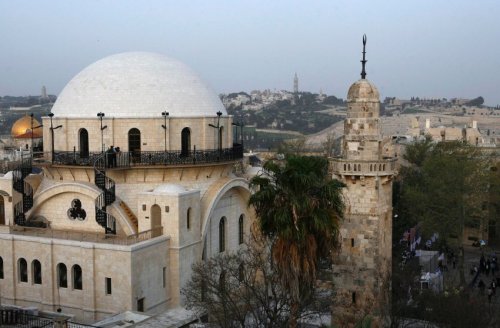
Palestinian radical group Hamas called for a "day of rage" after the Israelis opened the rebuilt Hurva synagogue, which was destroyed in 1948, in the Old City of Jerusalem. The Dome of the Rock can be seen in the distance. The synagogue is located in the Old City in territory Israel seized from Jordon during the 1967 Six-Day War. Khaled Mashaal, the Damascus-based exile leader of Hamas, said the reopening of Hurva signalled "the destruction of the Al Aksa Mosque and the building of the temple," reported Agence France-Presse. Photo: Reuters
SPIEGEL: So what is your solution?
Lieberman: I do not see a solution at the moment. We should concentrate on managing the conflict. Do you see a solution in Afghanistan? In Iraq?
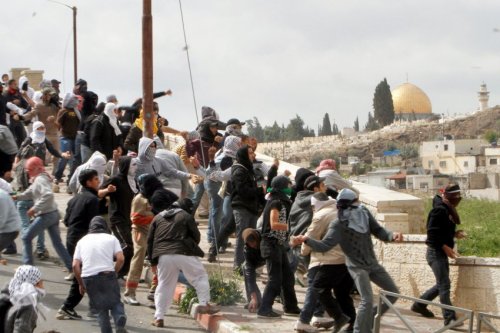
One day later, Palestinians threw stones and clashed with Israeli security forces in East Jerusalem. Photo: Reuters
SPIEGEL: In Afghanistan less, in Iraq more.
Lieberman: If the West failed in so many parts of the world, you cannot expect that the conflict in our corner, of all things, is solvable. You cannot stop an Islamist tsunami by building a small island somewhere in the ocean. The biggest problem is the aggressive influence of Iran.
SPIEGEL: The United Nations Security Council is currently debating new punitive measures against Iran. China and Russia have already announced that they oppose “crippling sanctions”. Without them, is it still possible to prevent Iran from building the nuclear bomb?
Lieberman: The problem is not only Russia or China, but also India, Turkey and others. But it would be enough to have tough sanctions from the West like the EU and the US and also Japan, Australia and Canada. That would suffocate the Iranian nuclear program.
SPIEGEL: Is Germany doing enough in your view?
Lieberman: Germany is playing a very positive role. During my last visit, I felt for the first time that the German government understands that tough sanctions are necessary. But I am afraid that disagreements and a lack of political will within the international community could prevent real sanctions.
SPIEGEL: Will there be a military strike then?
Lieberman: I don’t think that Israel should take responsibility for this issue. But we are not taking any options of the table.
Part 4: ‘Iran Is Threatening the Whole World’
SPIEGEL: What is the bigger danger for Israel: a nuclear Iran or Teheran’s support for Hamas and the Lebanese Hezbollah?
Lieberman: The biggest danger is the indecisiveness of the international community. Iran is threatening the whole world. It is not coincidental that they do not celebrate an “Independence Day,” but the “Day of the Islamic Revolution.” Revolutionaries always try to export their revolution, that was the case with the Bolsheviks and also with Che Guevara. Therefore, we see Iranian activities in the whole world: in Africa, in South America and of course in the Middle East: with Hamas, Hezbollah or Muqtada al-Sadr in Iraq. They are all proxies of Iran.
SPIEGEL: And that’s why Hamas weapons dealer Mahmoud al-Mabhouh had to be killed by the Mossad in Dubai?
Lieberman: You must have seen too many James Bond movies. I also saw the video of the Dubai police on TV, but there are is no proof whatsoever.
SPIEGEL: All the evidence points to Israel: The agents used identities of Jews who immigrated to Israel from Britain and Australia.
Lieberman: We are cooperating with Britain and Australia in the investigations. They sent police inspectors to Israel.
SPIEGEL: So you are saying it was not the Mossad?
Lieberman: We are fighting the terror every day. We try, despite everything, to remain a democracy with clear rules. I expect more understanding about our problems in the world.
SPIEGEL: One of the alleged killers used a German passport which he received on the claim that his parents were Holocaust survivors. The German Federal Prosecutor opened an investigation on charges of murder and spy activity. Will Israel answer a German request for help in this investigation positively?
Lieberman: We will assist as much as we can. We have very close cooperation between Germany and Israel, on all levels.

The foreign minister also dismissed criticism from Germany's foreign intelligence service, the BND, where officials are irritated that Israel killed a Hamas person while Germans were negotiating on Israel's request to help secure the release of Gilad Shalit, the Israeli soldier captured in a deadly cross-borde raid from Gaza in June 2006 and held in captivity ever since. BND officials have also claimed Israel backtracked from a prisoner exchange at the last minute. "I am not commenting on that," he told SPIEGEL. "We will do everything we can to close this highly sensitive chapter." Photo: Reuters
SPIEGEL: There is irritation within the German foreign intelligence service, the BND, because Israel killed a Hamas guy while the BND was negotiating on Israel’s request with Hamas over the release of kidnapped soldier Gilad Shalit.
Lieberman: We appreciate all your efforts in the case of Gilad Shalit.
SPIEGEL: Within the BND it is said that the Israeli governent backtracked from an agreed prisoner exchange at the last minute.
Lieberman: I am not commenting on that. We will do everything we can to close this highly sensitive chapter.
SPIEGEL: There seems to be a good chemistry between you and German Foreign Minister Guido Westerwelle. You smoked a cigar together in Jerusalem.
Lieberman: Westerwelle is a very serious politician. I think he represents Germany with dignity.
SPIEGEL: Most of the Germans have a different opinion. They think, Westerwelle behaves more like the leader of the opposition than a foreign minister. Why are you always perceived as the bad guy?
Lieberman: People can choose between the sweet lie or the bitter truth. I say the bitter truth, but many people don’t want to hear it.
SPIEGEL: Mr. Foreign Minister, we thank you for this interview.



 RSS
RSS


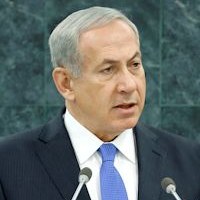

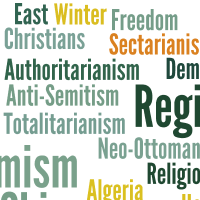
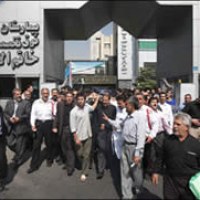





The Clash of Civilizations #israel http://j.mp/d2k6i5
Peace is not achievable where a populous lacks security, a measure of prosperity, or both. http://bit.ly/acgZlf #Iran #jihad #Israel
[…] This post was mentioned on Twitter by Trish Nelson. Trish Nelson said: Peace is not achievable where a populous lacks security, a measure of prosperity, or both. http://bit.ly/acgZlf #Iran #jihad #Israel […]
RT @CrethiPlethi: The Clash of Civilizations #israel http://j.mp/d2k6i5